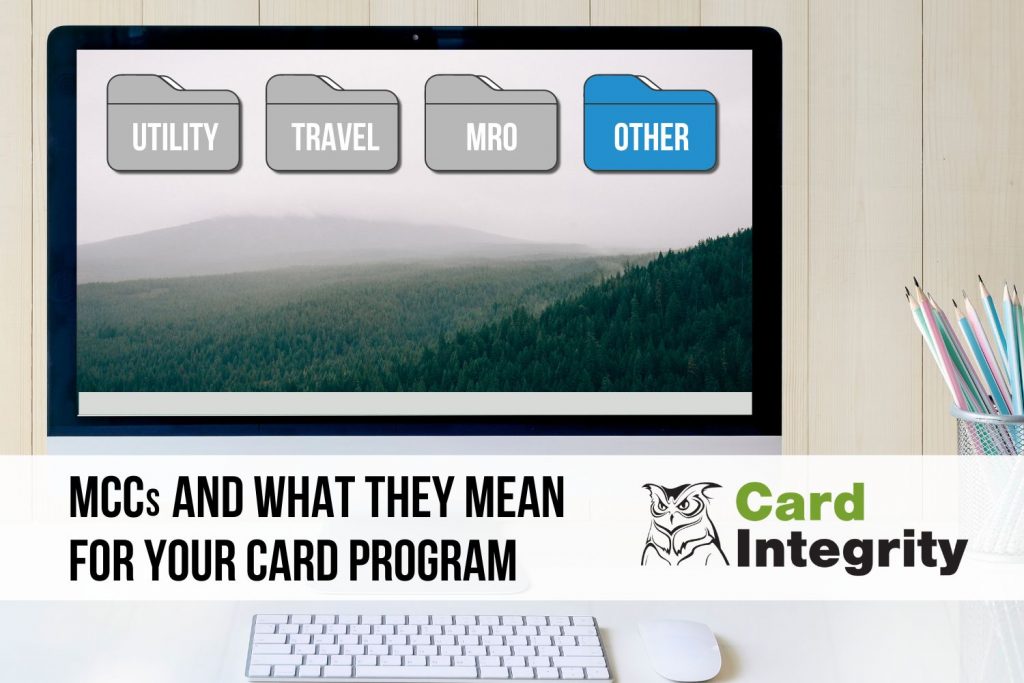
If you pay close attention to statements from your purchasing card (P-Card) banks and companies — as you should — you might have noticed a column with the heading “MCC,” followed by four-number digits.
But what does MCC actually mean? And what does it mean for your P-Card program?
The Definition of MCC
MCC is an acronym that stands for “Merchant Category Code.” The major card companies and banks break down the merchants who accept their cards into categories and assign each merchant, accordingly, a corresponding code consisting of four numbers.
These code numbers are consistent between the card companies and banks. For example, “1731” is always the MCC for “Electrical Contractors.” And for that code number, that’s the only merchant to whom it applies.
However, some code numbers cover several merchants within their category. For example, “4214” could refer to a local delivery service, a freight carrier, a trucking company, or a moving and storage company. That’s a pretty wide range of services, all under just one category.
The categories and codes were created so that the card companies could more easily track the different kinds of industries that are accepting their cards for transactions. It’s the responsibility of the card companies to assign a category to each merchant. Occasionally, a merchant might request to be under a particular category. But in the end, the card company or bank ultimately decides under which category a vendor will be placed.
Using MCCs to Identify a Vendor
Just as MCCs are used by card companies to track transactions, so can you — and so does Card Integrity. But what does that “tracking” look like? How does it work?
It’s achieved by using MCCs for identification purposes. You want to know where your card is being used. Typically, a vendor’s name gives that a way. For instance, if you see the name “Best Buy” on a receipt, while you might not know all the ins and outs of that transaction, you can feel pretty confident that the purchase involved technology. But, sometimes, a merchant name isn’t all that revealing.
An example, let’s say one of your employees frequently uses his card for a merchant that comes up on reports as “John’s Plumbing.” A quick assumption might be that your employee has been acquiring plumbing supplies for the company.
However, the MCC tells the true tale. Plumbing supplies fall under the MCC number “5074.” But John’s Plumbing most likely would have the MCC number 5813 — the MCC for drinking establishments. Because, in this case — that’s right — John’s Plumbing is actually a bar. That’s information that managers of a P-Card program would definitely want to know.
A recent example of this, is the MCC code for firearms. In September 2022, it was announced that credit card companies will start using a new code for gun purchases. The sale of guns had previously been classified as a general merchandise or sporting good.
The sale of guns had previously been classified as a general merchandise or sporting good.
Using MCCs as Alerts to Look Deeper
It’s important to note that using MCCs for better identification goes both ways. Just as an MCC can better define the merchant in use, the fact that its categories can also be quite broad is also important to know, as further examination of a suspicious business name can better determine how a card is being used.
Let’s say that the MCC code 4214 does come up in a data report. Your company does a lot of shipping, so this code comes up often, and legitimately so. However, for one instance, you discover that the 4214 code denotes a business with the name “Jameson Movers.”
This is a reg flag that should move an in-the-know reviewer to examine the transaction more deeply — because while a trucking company might make sense as an expense for your business, a moving company would not. You’d want to discern that the purchase was for the shipping of your products to a distributor, rather than the moving of furniture and other personal belongings from an employee’s old home to her new residence.
Where Card Integrity Comes In
When it comes to transaction receipts and statements, MCCs are a regular part of Card Integrity’s review services. Thanks to our integration of high-tech software together with an experienced human’s eye, we easily recognize and connect the dots of discrepancies such as names that don’t jive with MCCs or MCCs that aren’t part of your regular business expenses. In fact, Card Integrity relies less on MCCs and more on analytics.
To ensure that your MCCs aren’t getting lost in the reviews of your transactions, call Card Integrity today at 630-501-1507, or contact us via our website.
Was this article helpful? Keep work colleagues informed, share this article!
Refreshed and republished on 10/12/2022 with updated news and information.

